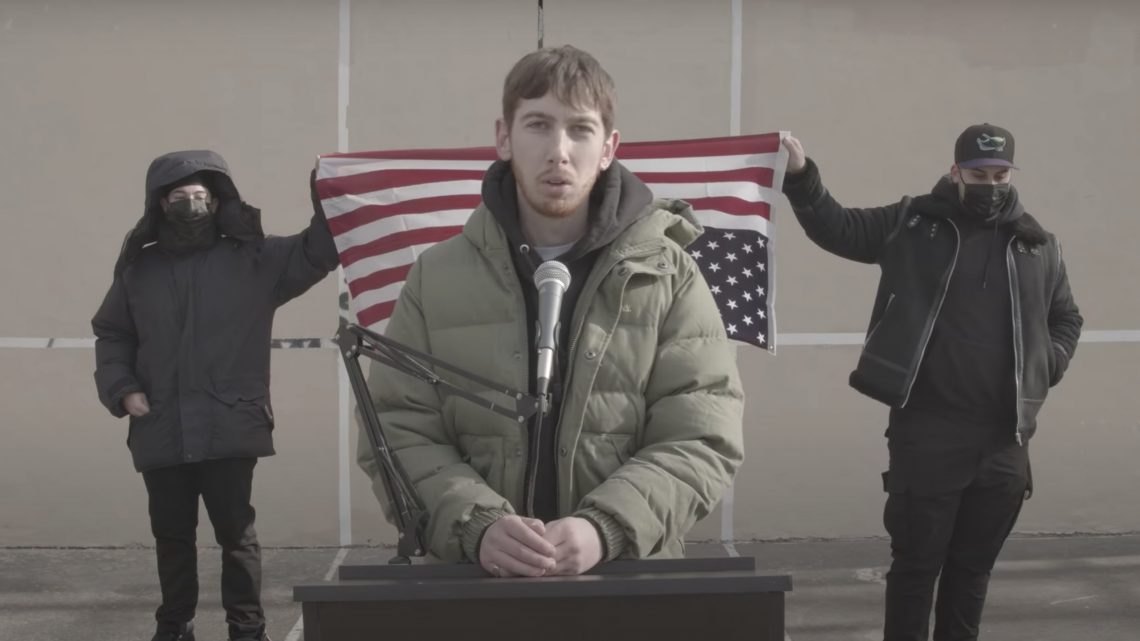
Marlon Craft Explains His “State of the Union”
January 22, 2021The music video for the Hell's Kitchen rapper Marlon Craft's "State of the Union" is not much to look at. In the performance, Craft is flanked by two masked men holding up an upside-down American flag as he addresses the camera head-on. The song sounds like a response to the Capitol riots, but it was recorded prior to January 6, Craft told VICE.
"State of the Union" is a densely-packed postmortem on the Trump presidency, and the current precarious condition of the country. If you've heard of Marlon Craft, it's most likely from his technical and transparent performances on Sway in the Morning, where he impressed both Sway and Heather B, and a freestyle on Hot 97, where he rapped "I make a living now off what ate me up privately," to a visibly confused Funk Flex.
Released on January 19, "State of the Union" is an interesting contrast to Macklemore's "Trump's Over Freestyle," which dropped the following day. While "Trump's Over" is an upbeat, celebratory track, Craft's take is a bleaker and lengthier diagnosis. Both dispatches from white rappers, at points, touch on the topic of privilege. In "State of the Union," Craft singles out white liberals, who "make a social identity from giving a fuck, but that privilege they may acknowledge, they ain't giving it up." His message begins simply: "The state of the union is that there isn't one."
The Hell's Kitchen rapper spoke to VICE about "State of the Union," and what he sees happening next.
VICE: When did you first decide to make that song?
Marlon Craft: I figured a lot of people would think I did that song in response to the riots at the Capitol. The irony is I submitted that song to DSPs [digital streaming platforms] that morning. By the afternoon, I'm watching everything that's going down, and I'm like, 'Holy shit.'
I'd written that song about a month or so ago. I'd been planning to drop it on Inauguration Day. After the Capitol happened, I decided to change it to the day before. It became more relevant with those events. It's just a response to what's been going on generally, because those of us that have been paying attention knew that the handwriting was on the wall for what happened at the Capitol.
You've said as a white dude, in a Black culture, you do feel a responsibility to the culture. This was in 2017. How you feel about that now? Has that changed?
It's the responsibility of white people in general in America, which is a lot of what I talked about in the song, but especially those that are participating in Black culture and looking to make a living from Black culture, like I do because I'm in the hip-hop space, it's time that we find our way to contribute, and try to give back and not just take from cultures.
I'd written that song about a month or so ago. I'd been planning to drop it on Inauguration Day. After the Capitol happened, I decided to change it to the day before. It became more relevant with those events. It's just a response to what's been going on generally, because those of us that have been paying attention knew that the handwriting was on the wall for what happened at the Capitol.
In the song you ask "how many white mirror convos really bearing fruit?" What are white mirror conversations?
When we look at ourselves in the mirror, we think about, number one, what do you do in your space every day? Also it's the concept of privilege. You can't raise everybody to the level of privilege, without you giving some of it up. We have to think about what it is that we're willing to do.
I think people are posting things online and then feeling like they're absolved, because they think the right things. You're not what you think. You are what you walk around and do every day. When you look at the older vanguard of so-called white American progressiveness, there's this real hesitancy to relinquish power. Let's be honest about where that comes from. Because you're conditioned to feel like you're entitled to it. And that's whiteness. That doesn't mean that you are the evil equivalent of Donald Trump. But this false dichotomy of us versus them, there's a lot of them in us.
This song is about what's going on in this country broadly, in pretty stark terms. But it ends with a slightly optimistic appeal to individuals. Are you optimistic about what happens next?
I wouldn't say I'm optimistic. But I would say that the ending tenor of the song is hopeful. The job of the artist is to provide hope, even in the bleakest of times. We have to believe in our own ability to change things. If there's any positive [aspect] to what's been going on, that's on display. The great lie is that the people don't have power. Especially for millennials, you've got your student loan debt, your job, the workday grew two hours a day without anybody noticing, you're incredibly busy, all your technology to keep you numb, all that stuff is there for a reason. There is a lot of profound power in the actions that we take every day. I Just hope that people realize that, and feel some type of autonomy over our future.
You mention streaming, and how what's popular, isn't necessarily what's good. Obviously, the top of mind example is Donald Trump. Is that something you see in music?
What I was saying on the song, there's rappers streaming tens of millions that aren't considered popping. There's rappers—and I know them—that are good, and that are out here that are streaming as much as a lot of other rappers that people perceive to be mainstream. We have to be more critical of what is popular, because that's how we get to the place where we are in politics. All these policies like common sense gun control, and legalized marijuana, the majority of people have been behind for a minute.
What feedback have you gotten on the song?
It's been overwhelmingly positive. A lot of emotion, a lot of people feeling like it's a synthesis of thoughts they've had. One guy yesterday in the Center [a Patreon-like site Craft maintains for a direct link to his fans] felt really called out by it, and he thanked me for that. I thought that was ill. A lot of artists that I respect reached out to me and showed love. So it's been really dope. Obviously, you have Trump supporters, it's a dogma, they're in the comment sections and they're mad. What I like about the piece is it's four and a half minutes, and you could agree with four minutes of it, and there could be twenty seconds that you disagree with. Unless you're me, you probably don't full heartedly agree with every single thing that I said.
Marlon Craft's latest album, ‘How We Intended.’ drops on February 10. "State of the Union" is streaming now.
Follow Ashwin Rodrigues on Twitter.


